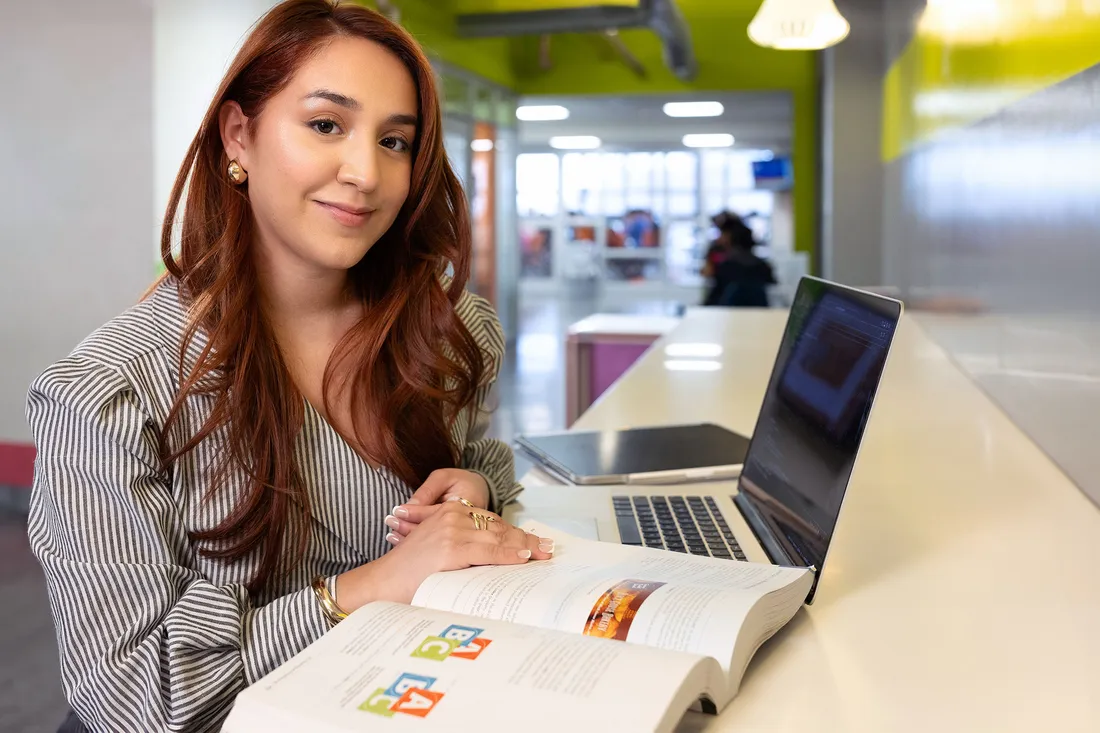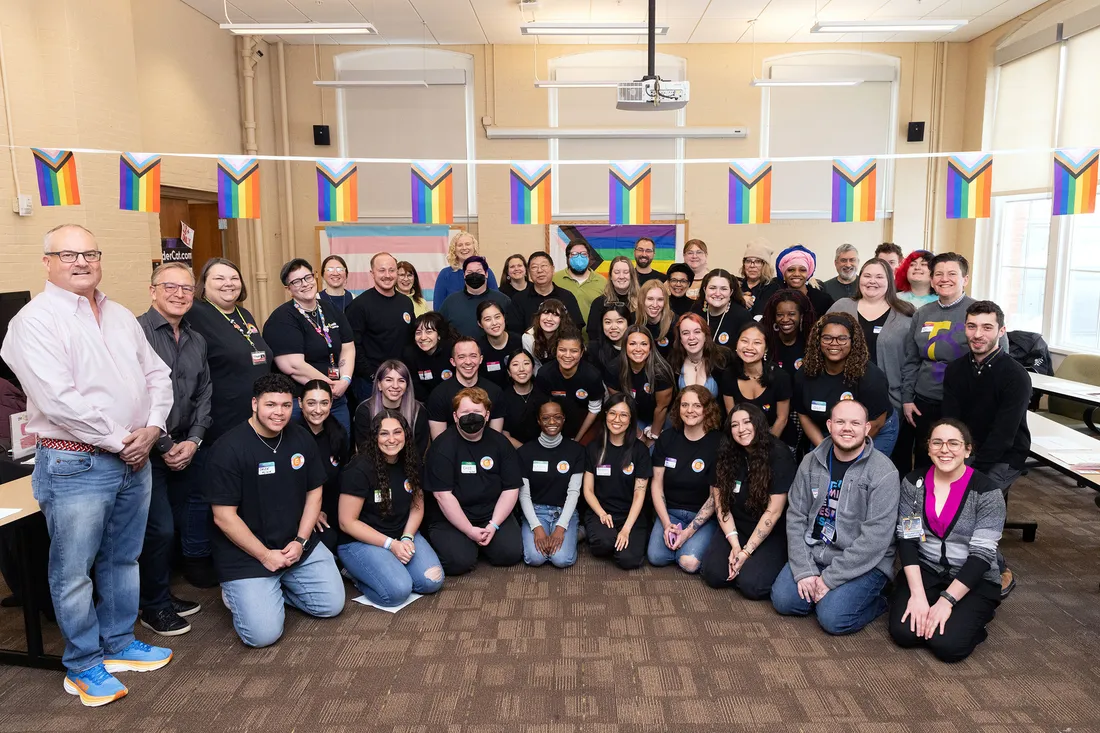
Trans Team members, community resource representatives and health providers gather in Peck Hall for Trans Support Day in March.
In 2004, Deborah Coolhart G’01, G’06, a professor in the Department of Marriage and Family Therapy (MFT) in the David B. Falk College of Sport and Human Dynamics at Syracuse University, was receiving more requests for counseling transgender clients in her private practice than she could manage. To remedy the situation—and ensure gender affirming therapy and referrals to much-needed services—she established what’s known today as the Transgender Affirmative Support Team (Trans Team). MFT graduate students—who comprise the team—receive specialized training to provide counseling for trans people and other members of the LBGTQ+ community and their families. “I always tell people to never underestimate the value of one affirming voice,” Coolhart says. “A lot of times trans people are buried by all kinds of negativity and just having one person who supports them can literally save their life.”
Trans people navigate a host of personal and societal challenges. They may encounter issues with family acceptance and a transition process that can provoke anxiety and depression, says MFT teaching professor Tristan Martin G’20. And while seeking support and understanding, they’re often subjected to oppression and discrimination. According to the Trans Legislation Tracker, more than 500 anti-trans bills are currently under consideration in state legislatures across the country. “A handful of states have passed anti-trans laws, and that’s a major stressor for the trans community,” Martin says.
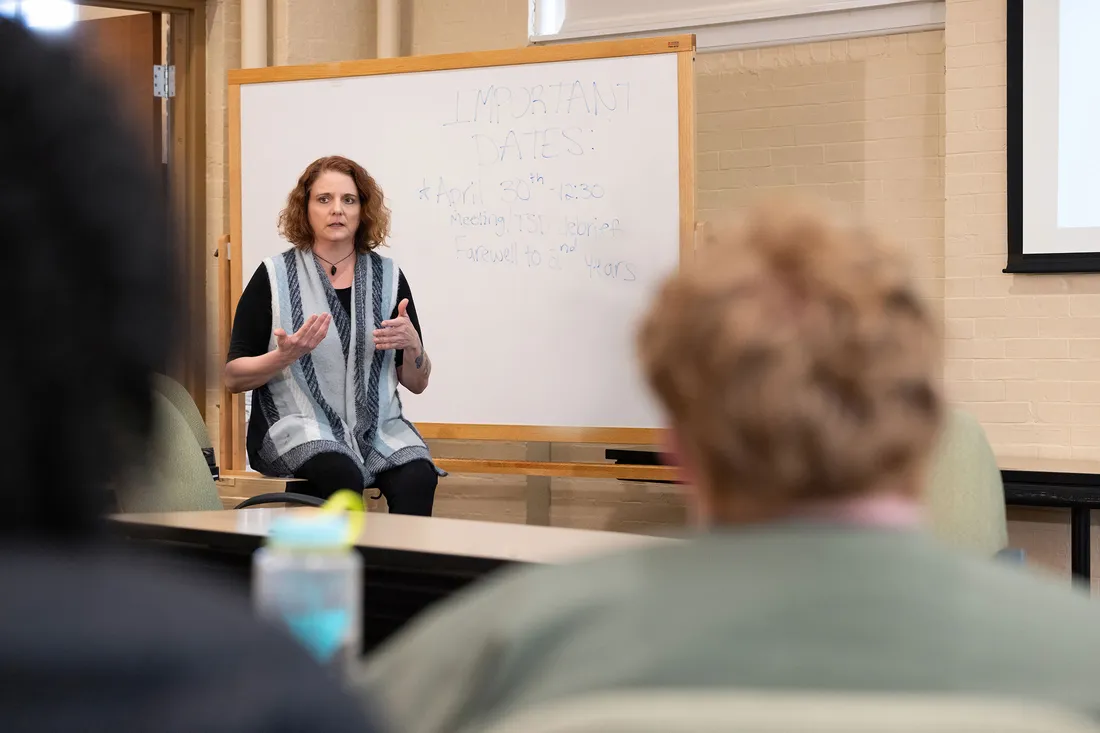
Marriage and family therapy professor Deb Coolhart G’01, G’06 in a discussion during the team’s monthly meeting in April.
Gaining Clinical Experience
MFT students gain experience through clinical work at the department’s Couple and Family Therapy Center, which provides free counseling services to area residents and the University community. The students complete 500 hours of supervised internships and clinical practice with individuals, couples and families. They learn to write letters of support for trans clients, a first step in helping a person begin their transition with hormone therapy and medical procedures. “If you’re affirming and supportive of somebody’s experience, that can be powerful,” Martin says. “Our students are budding therapists, so I don’t expect them to know how to do all the interventions, but if they can listen and validate clients, that’s all it really takes sometimes.”
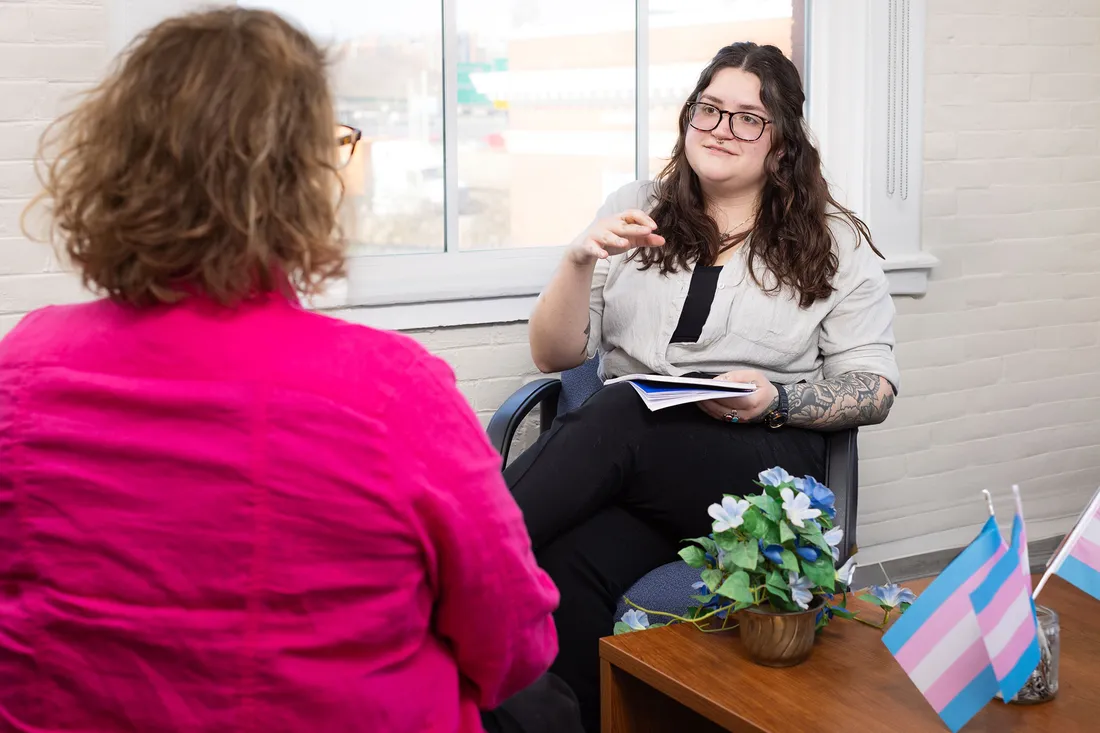
Marriage and family therapy graduate students and Trans Team members Lynnie Westafer G’25 (left) and Sophia Widdekind G’25 demonstrate a counseling session.
According to MFT clinic director Tyler Sliker G’14, about 25% of the center’s clients are trans or gender-nonconforming in some way. “This population makes up a much higher percentage of the clients than our students would have the opportunity to work with in a community internship,” Sliker says. “Our community knows that we specially train students to serve this population well, so we’re one of the go-to referral sources for trans and gender nonbinary folks.”
We work on preparing this event all year, but it’s a labor of love and a privilege to do this for the community.
Kirsten Mathieson G’24
Many students who enroll in the program have a specific interest in working with the LGBTQ+ community. Trans Team member Josiah Parker G’25 was a development director at a community health center when he shifted his professional focus and enrolled in the MFT graduate program after hearing Coolhart give a presentation. “I love this program, and the focus is what drew me to it,” Parker says. Indigo Vooris G’25 was interested in working with couples and being a Trans Team member clinched their decision. “We’ve created an excellent community space, and I feel supported in my everyday life,” Vooris says. “For me, the most special thing about the Trans Team is how it’s integrated into all the amazing things we’re learning.”
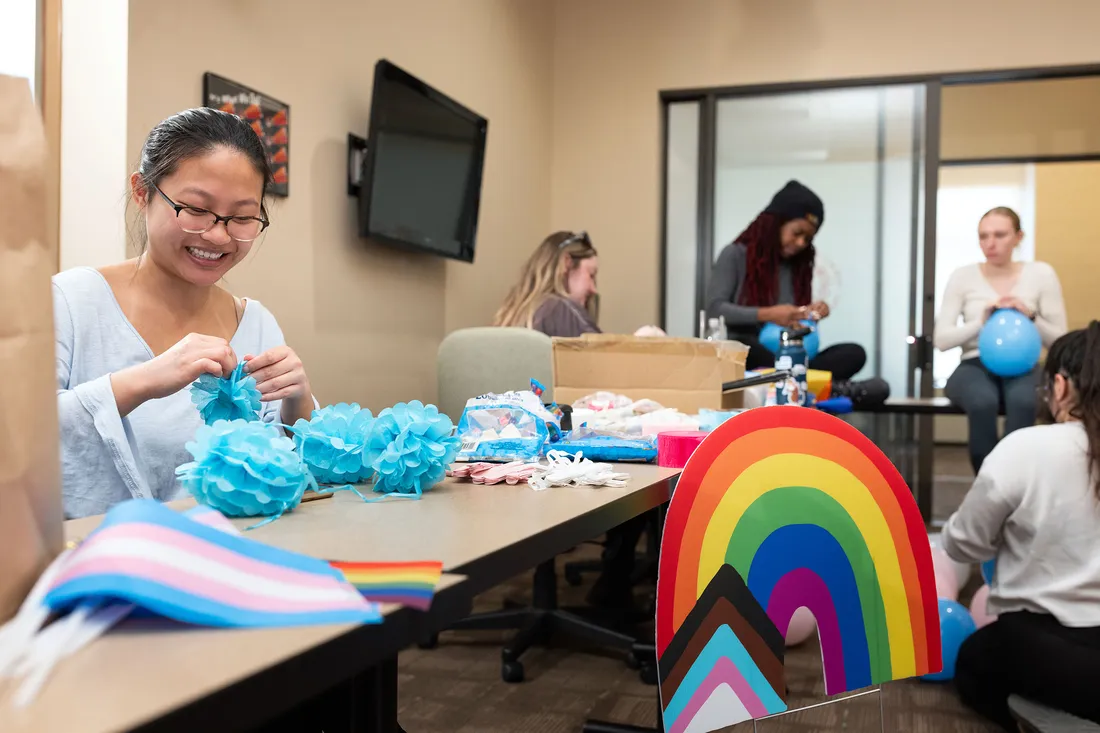
Trans Team members (clockwise from left) Lia Figurelli ’22, G’25, Nora Cyr G’24, Kalila Taylor G’24, McKenzie Leahey G’25, and Alyssa Urteaga G’24 make decorations for Trans Support Day.
Coolhart and Martin regularly meet with Trans Team members to discuss cases and provide training and guidance. Trans Team President Kirsten Mathieson G’24 and Vice President Gabby Presutti G’24—who established the team as a registered student organization in 2023—say the team likes to celebrate client wins together, such as completing their name change or a medical procedure. “Having a community that is affirming and supportive of their needs and advocates for what they want can mean everything to a lot of them,” Presutti says. “Sometimes we are the only people in their lives who support them and are open, loving and caring to their needs.”
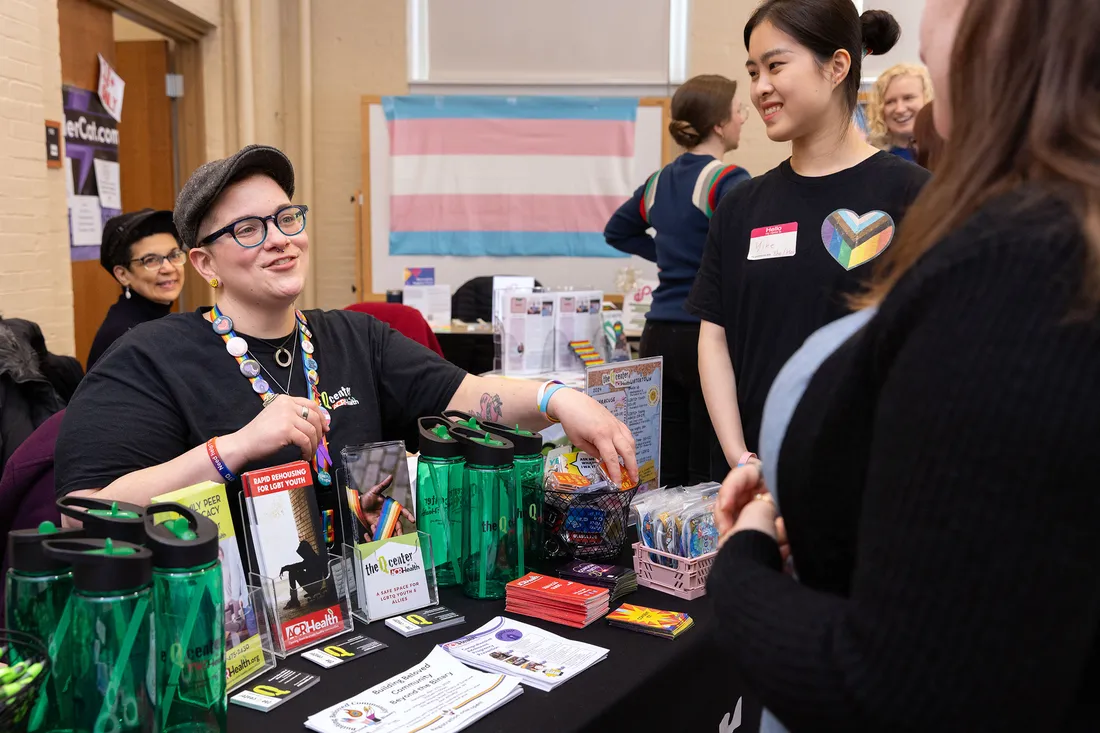
Q Center staff member Charlye Rosamilia (left) and Trans Team member Yike Tang G’24 visit on Trans Support Day.
Bringing a Community Together
A major undertaking for the Trans Team is organizing and hosting Trans Support Day. At this year’s event, held on a snowy Saturday in March, the team welcomed more than 240 guests to Peck Hall for the second straight year. It was a day of celebration that featured community resource representatives and health providers, a free clothing store, hair and makeup stylists and other offerings. “We work on preparing this event all year, but it’s a labor of love and a privilege to do this for the community,” Mathieson says.
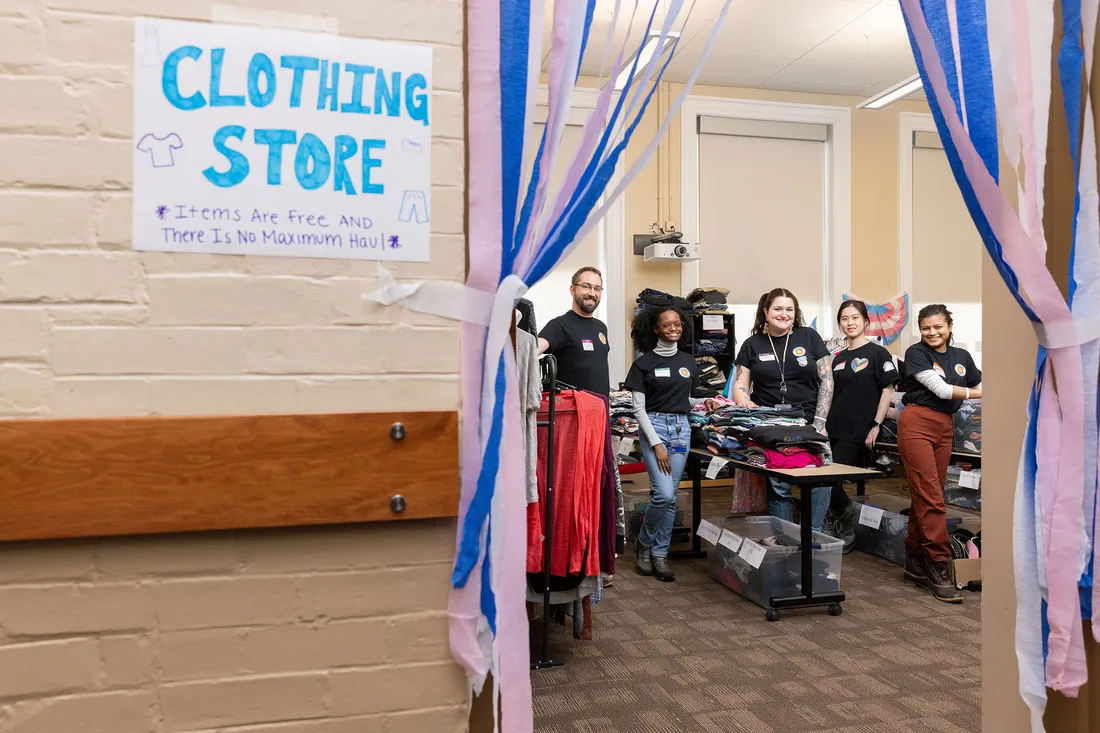
The free clothing store is a popular place on Trans Support Day, offering non-gendered items for visitors. Pictured (from left) are Trans Team members Josiah Parker G’25, Chloe Osborne G’25, Sophia Widdekind G’25, Yike Tang G’24 and Heidy Montes G’24.
Casen, a Syracuse resident, attended the event for the second time. He began his transition about two years ago with the support of family and friends. Others, he says, aren’t as fortunate in gaining acceptance. He appreciates that Trans Support Day brings all the available services together in one place where people can receive information and talk in a safe space. “People can come to Trans Support Day and be themselves, be safe and appreciated, and just have fun,” he says. “I know when I am surrounded by people who understand and accept me, that affirms me and my gender and makes me feel really good about myself. It’s also important for a lot of people in the trans community because they don’t know where to go—here, they can learn about the resources they need to take the steps in their journey.”


